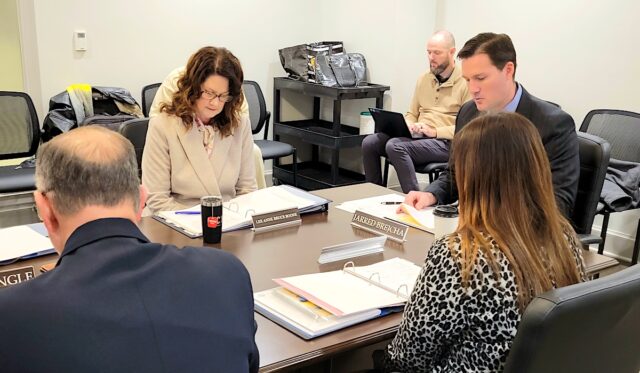

The Oklahoma Ethics Commission’s new director announced today that its Guardian System, a database used for reporting and tracking campaign financial information and lobbyist registrations, will be extended through February 2025.
The Guardian System had been scheduled to lose functionality after July 1 because the software and services firm Civix had decided to shelve the underlying software used to operate Oklahoma’s reporting system. With July 1 landing in the middle of the 2024 election cycle, the Ethics Commission’s prior director, Ashley Kemp, had called the looming expiration a “nightmare” scenario. In December, the commission approved hiring an attorney to pursue potential litigation with the company.
But when new executive director Lee Anne Bruce Boone started her tenure at the agency this month, she said she decided to reach out to Civix and get a sense of the situation herself.
“I think with any new position comes just a little bit of room to explore things, and I just really wanted to take advantage of that,” Bruce Boone told NonDoc on Monday. “I had not had contact with anyone from Civix, and I just picked up the phone and called and said, ‘Hey, I’m new. Where are we? What’s happening, and what can we do to try to work things out?’ They were receptive. They’ve had a change in leadership also, in terms of a new CEO, and I think that made a difference as well.”
Soon thereafter, the Ethics Commission sent the company a proposed addendum to extend the software support for the Guardian System eight months through Feb. 28, 2025.
“I think it’s a great short-term solution. It’s a win for the commission, it’s a win for the Legislature and for Oklahomans,” she said. “However, long-term we’re still back to the drawing board in terms of after February of 2025. We have to find a long-term solution. So we’ll be doing that, and that most likely means an RFP process and moving forward in that direction. We’re just not there yet.”
Bruce Boone said the extension with Civix buys “some much-needed time” as she speaks with leaders of the Oklahoma Legislature about funding to build the next iteration of the Guardian System. In her press release Monday, Bruce Boone listed $1.6 million as an estimated cost, but in an interview she called that a “best guess” based off a scope of work provided in the past by Civix.
“That’s what’s out there right now. And being transparent, I don’t think we’re exactly sure what the final number will need to be for a new system,” Bruce Boone said. “My message is that this (online) system allows us to comply with the existing rules and the constitutional requirements that are out there and it allows us to do it in a much easier way than going back to paper requirements.”
Senate Appropriations and Budget Committee Chairman Roger Thompson (R-Okemah) called news of the extended timeline “a great thing” as the 2024 election cycle heats up.
“That was a concern of mine as well,” he said. “We’re going into an election year, and that’s not a good time to be changing your software.”
Thompson said he is “excited” about Bruce Boone’s early leadership at the agency, and he pointed to Sen. John Haste (R-Broken Arrow) as someone involved in discussions with the Ethics Commission’s legislative asks.
“I want to make sure we’ve got the correct software, but I want to make sure we aren’t spending more on it than we need to,” Thompson said.
In Monday’s press release, Ethics Commission Chairman Jarred Brejcha said he was pleased that Bruce Boone “was able to reestablish conversations that had been trending unproductive.”
“There’s still work to be done with long-term funding for this service, but this ensures short-term current election support which should put people at ease and allow us to make the best use of our time for system development into the future,” Brejcha said. “Legislators need to know we’ve done well so far, but their funding is still needed.”




















